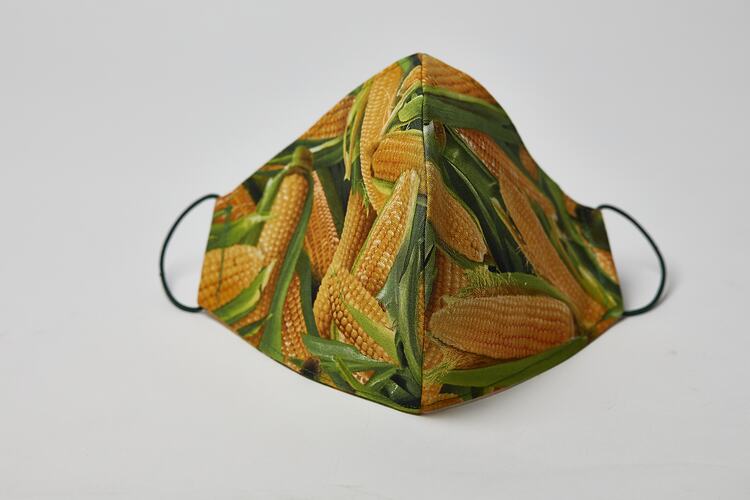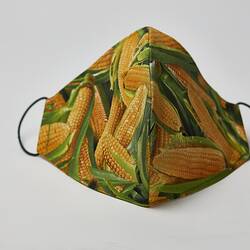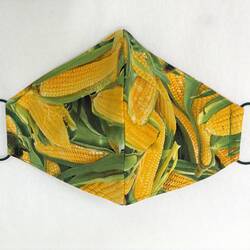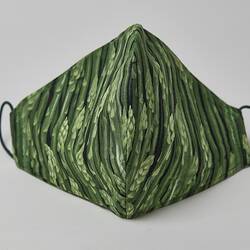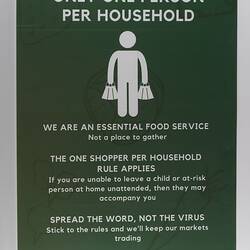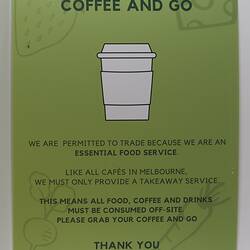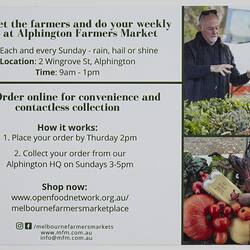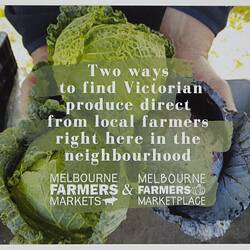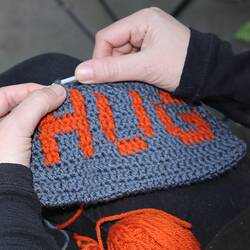Summary
Fabric cotton face mask with sweet corn print.
This mask was worn by John & Pam Hobson and their family at Melbourne Farmers Markets during the COVID-19 pandemic in 2020. John & Pam are sweet corn, asparagus and pea farmers from Jonella Farm, Cardinia.
Illona Brzezowski (Loni), Pam & John's niece who also worked on their stall during the pandemic, reflected in February 2021 on the Melbourne Farmers Markets and their masks:
'We felt very fortunate during Covid to be able to continue doing what we love which is bring our produce to the farmers markets. By providing a Covid safe environment the market organisers ensured the farmers and customers could attend in a safe manner. This allowed us all to maintain some normality in our otherwise very changed lives and we were all so grateful for this. The feedback from our customers was that the ability to still be able to go out and obtain our fresh produce straight from the farm helped to ease the stress that they were feeling from having to be in lockdown. The outing gave them something to look forward to and the produce that they know and love allowed them to create delicious and nutritious meals for the family like they usually did.
To add some light-hearted relief to the requirement of wearing face masks our very clever friends made themed face masks for us - decorated with asparagus and corn for each of our seasons. The customers were delighted to see us wearing these and have added some brightness to our market stall! They certainly have been a talking point and captured attention.'
The mask was made by fellow Melbourne Farmers Markets stall holder Amanda Masters (an employee of Weyhill Garilic Farm) and given to the Hobson's as a gift. She started making the masks during the first lockdown, first using the pattern provided by the Victorian Department of Health, and then watching YouTube tutorial videos, before finally creating her own design. When elastic became scarce when masks were made mandatory, Amanda used hair ties, 'surprisingly, they were the correct size!' Inspired by patterned fabrics she saw in quilting shops and online, Amanda made themed masks for her family and friends.
'I am a primary school teacher so I knew that my colleagues would enjoy having more child-friendly prints on their masks. Selecting the vegetable and fruit printed fabric seemed like a logical idea to me. If you look at the 'contacts' list in most phones of farmers market stall holders, you'll see other stallholders listed with their produce eg Di Rhubarb, Gordon Potatoes, Pam and John Corn and Asparagus, Nardia Cheese.'
Physical Description
Cotton fabric face mask with sweet corn print and dark green elastic ear loops (hair ties) at each end. Two layer with same print on the inside.
Significance
With support from the Office for Suburban Development, this face mask is part of a wider collection of objects and photographs relating to the Melbourne Farmers Markets that were acquired into Museums Victoria's State Collection in early 2021. These items - including social distancing signage, vegetable-themed face masks and photographs - provide lasting documentation of the role of the Melbourne Farmers Markets in providing food and produce to Melburnians during the coronavirus (COVID-19) pandemic in the months of 2020-early 2021.
Food security and having access to fresh food became a key concern of many Victorians during the emergence of the pandemic. Fears about the fragility of international and domestic food supply chains - coupled with the announcement of lockdowns and 'Stay at Home' restrictions - led many consumers to rush to supermarkets and shops to fill their cupboards. Panic buying, where shelves were stripped bare of produce, became one of the earliest and most potent symbols of the public fear response to the pandemic. While supermarkets struggled to cope with the increased consumer demand, the Melbourne Farmers Markets provided an alternative way for consumers to access produce directly from local farmers and in doing so, support local and small-scale farming businesses through a period of lockdowns and uncertainty.
Prior to the COVID-19 pandemic and since its' establishment in 2002, the Melbourne Farmers Markets had long been committed to supporting small-scale Victorian farmers, vegetable growers, orchardists, apiarists and other producers, with a strong focus on strengthening relationships between the consumer and the producer. This ethos of supporting farmers and strengthening consumer/producer relationships became increasingly important during the COVID-19 pandemic, particularly due to the fact that many farmers had been substantially impacted by COVID-19 lockdowns and restrictions, with some losing the majority of their hospitality trade overnight and being faced with the issue of excess crops.
At the time the pandemic reached the State of Victoria, in early 2020, the Melbourne Farmers Markets Association were operating seven markets across the Melbourne region: Abbotsford, Alphington, Carlton, Collingwood, Coburg, Gasworks and the University of Melbourne. Four of these markets closed down during the pandemic, but three continued to operate and remained open as an 'essential service' throughout lockdowns. Adapting the markets to be 'Covid safe' was a challenge for both staff and customers; hand sanitisation, density controls, 1.5m queueing, cashless payments, discouraging social interactions and maintaining strict social distancing were some of the measures put in place to be able to meet the Victorian Government and DHHS requirements. Through these challenges and adaptations, the Melbourne Farmers Markets continued to provide an important meeting place where consumers could come together to purchase fresh produce and have a direct connection with the farmers that were producing their food.
This collection of Melbourne Farmers Market items providing lasting documentation of how the Melbourne Farmers Markets Association - including its' 150 Victorian farmers - adapted to the challenges of COVID-19 and pivoted their markets to operate in line with social distancing measures. They highlight a range of storylines and themes including; food security, food supply chains, small-scale farming, local food movements, emergency food relief, the impact of lockdowns on hospitality and agriculture industries and the various ways that producers and consumers adapted to the challenges of COVID-19. It also provides an important example of place-based community activity, where local communities were able to come together outdoors, in their local neighbourhoods, during a time of lockdown and social isolation.
More Information
-
Collection Names
-
Collecting Areas
Sustainable Futures, Clothing & Textiles, Medicine & Health, Home & Community
-
Owner
-
Maker
-
Classification
-
Category
-
Discipline
-
Type of item
-
Overall Dimensions - Folded
174 mm (Width), 11 mm (Depth), 168 mm (Height)
-
Keywords
Agriculture & Farming, Commerce, Retailing, Farmers, Corn, Masks, COVID-19 Pandemic, Pandemics, Markets, Vegetables
